A CFD (Contract for Difference) broker is a financial service provider that allows traders to speculate on the price movements of various assets, such as forex, stocks, indices, cryptocurrencies, and commodities, without owning the underlying asset. CFD trading involves going long or short, using leverage to amplify gains (and losses), and carries a high level of risk. Reputable CFD brokers are regulated and offer platforms for speculative trading across multiple markets.
We reviewed and tested various CFD brokers to evaluate their performance, features, and trustworthiness. At WR Trading, we’ve reviewed and compared the most reliable CFD brokers based on platform quality, spreads, commission structure, available leverage, regulation, and reputation. In this guide, we present our top 10 picks, offering a clear comparison to help you choose the right platform based on your trading needs and risk appetite.
CFD Broker:
CFDs:
Advantages:
Account:
10,000+ CFD Markets
Raw Spreads from 0.0 Pips
- 5x regulated broker
- Spreads from 0.0 Pips
- More than 10,000 markets
- Leverage up to 1:500
- Low Commission from 3$/1 Lot
- High liquidity and fast execution
- TradingView, MT4/5, cTrader, IRRES
1,000 CFD Markets
Raw Spreads from 0.0 Pips
- ECN Accounts
- Spreads from 0.0 Pips
- Copy Trading available
- Leverage up to 1:500
- Low Commission from 1.5$/1 Lot
- High liquidity and fast execution
- TradingView, MT4/5, cTrader, Pro Trader
1,000 CFD Markets
Raw Spreads from 0.0 Pips
- Different ECN Accounts
- Spreads from 0.0 Pips
- Copy Trading available
- Leverage up to 1:500
- Low Commission from 6$/1 Lot
- High liquidity and fast execution
- MT4/MT5/RTrader/CopyFX
1,000 CFD Markets
Raw Spreads from 0.0 Pips
- ECN/STP Accounts
- Spreads from 0.0 Pips
- Leverage up to 1:1000
- Low Commission from 3$/1 Lot
- High liquidity and fast execution
- MT4/5 and Pro Trader
26,000+ CFD Markets
Raw Spreads from 0.0 Pips
- No Minimum Deposit
- Spreads from 0.0 Pips
- 26,000+ Markets
- Leverage up to 1:500
- Low Commission from 2$/1 Lot
- High liquidity and fast execution
- TradingView, MT4/5, cTrader, Invest Account
- New Zealand regulated
1,200 CFD Markets
Raw Spreads from 0.0 Pips
- Tier-1 Regulated Broker
- Spreads from 0.0 Pips
- Leverage up to 1:500 (1:30 EU)
- Low Commission from 3$/1 Lot
- High liquidity and fast execution
- TradingView, MT4/5, cTrader
2,250 CFD Markets
Raw Spreads from 0.0 Pips
- Raw Spreads from 0.0 Pips
- Leverage up to 1:500
- Low Commission from 3$/1 Lot
- High liquidity and fast execution
- cTrader, MT4 ,MT5
700 CFD Markets
Raw Spreads from 0.0 Pips
- Multiple regulated
- Spreads from 0.0 Pips
- Leverage up to 1:500 (1:30 EU)
- Low Commission from 2$/1 Lot
- Personal support
- MT4, MT5
200+ CFD Markets
Raw Spreads from 0.0 Pips
- Spreads from 0.0 Pips
- Leverage up to 1:500
- Low Commission from 4$/1 Lot
- High liquidity and fast execution
- TradingView, MT4/5
1,000+ CFD Markets
Raw Spreads from 0.0 Pips
- Offshore A-Book Broker
- Spreads from 0.0 Pips
- Leverage up to 1:500
- High liquidity and fast execution
- MT4, MT5
List of the 10 Best CFD Platforms:
In this section, we provide a short review of each of the top 10 CFD brokers, focusing on key facts like regulation, leverage, spreads, fees, platforms, customer support, trade execution, along with insights from our personal testing and review process.
1. FP Markets
FP Markets excels with its competitive spreads and exceptional customer service, making it the best CFD broker in our comparison. When we started using their platform, it was clear that FP Markets is designed with both beginners and experienced traders in mind. The interface is clean and intuitive, making navigating various tools and features easy. The broker offers a wide range of CFDs, including forex, indices, and commodities, providing ample opportunities for diverse trading strategies.
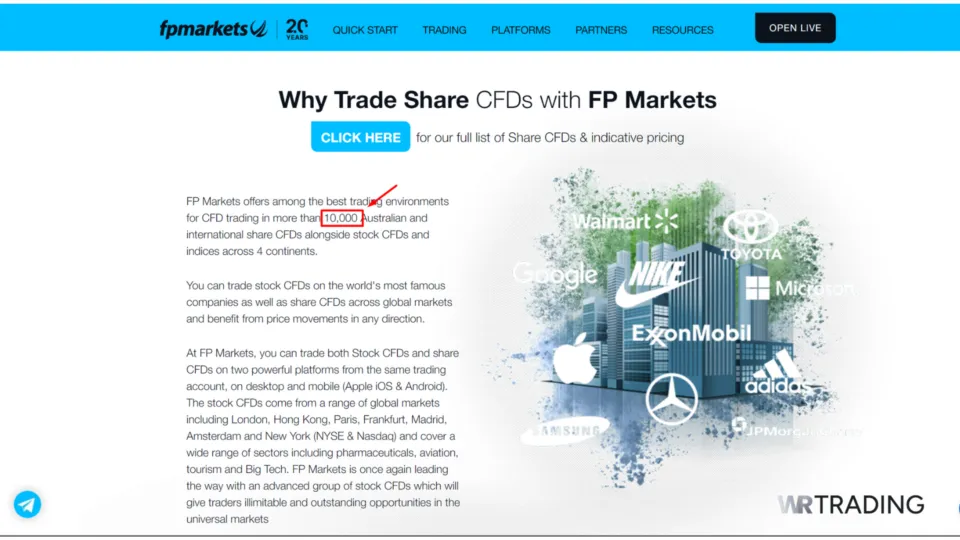
Our experience with FP Markets was smooth and hassle-free. The execution speed was reliable, and the platform’s advanced charting tools and analytical resources met the needs of more sophisticated traders. We appreciated the wealth of educational materials available, which is perfect for new traders looking to get up to speed. Customer support was helpful, ensuring that any issues were quickly resolved.
| Feature | Information |
|---|---|
| Spreads and Commission | Varies based on account: Spread – from 0.0 pips Commission – From no commission to $3 per lot |
| Trading Platforms | MetaTrader 4, MetaTrader 5, cTrader, TradingView, IRESS, and WebTrader |
| Asset Types | Forex, stocks, indices, commodities, cryptocurrency, and ETFs |
| Tradable Assets | Over 10,000 CFDs |
| Leverage | 500:1 |
| Customer Support | Email, live chat, and phone support |
| Demo Account | Yes |
| Educational Content | Video tutorials and trading glossary |
| Trade Execution Time | Under 40 milliseconds |
| CFD Swap Fees | Swap fees vary by asset, position type, and account; full rates shown in MetaTrader |
| Regulation | ASIC, FSCA, FSA, FSC, and CySEC |
2. Vantage Markets
Vantage Markets offers a sophisticated and accessible trading experience. As we navigated through the CFD broker, we found the design sleek and intuitive, making it easy for newbies and seasoned traders to find the needed features. What grabbed our attention were the educational resources. With webinars, tutorials, and in-depth market analysis, Vantage Markets ensures you have all the tools you need to trade smartly.
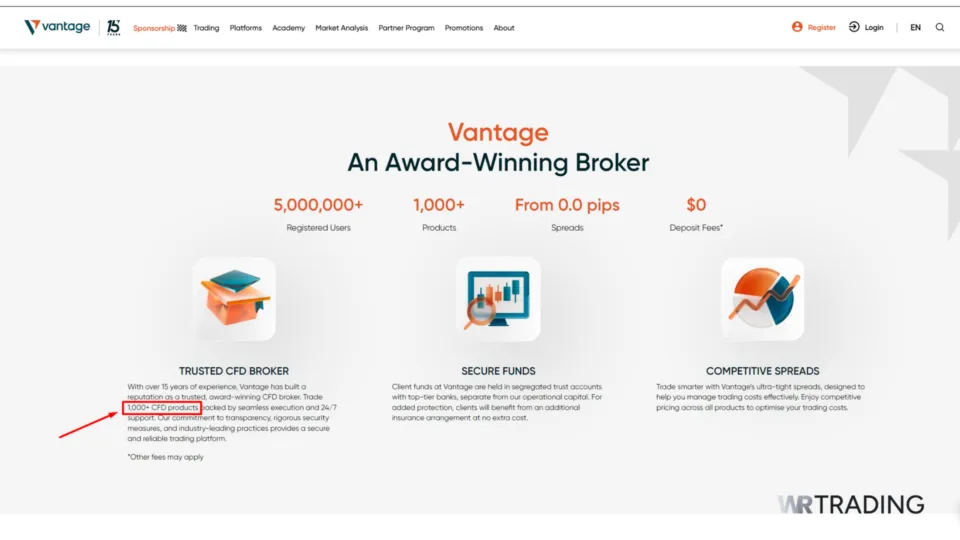
Our hands-on testing highlighted Vantage Markets’ quick and reliable trade execution. This is a big win if you want to capitalise on market opportunities without delay. Plus, the platform supports a variety of trading instruments, from forex to commodities and indices, giving you plenty of options to diversify your portfolio. The broker supports the top trading platforms such as Vantage App, MetaTrader 4, MetaTrader 5, and ProTrader.
| Feature | Information |
|---|---|
| Spreads and Commission | Varies based on account: Spread – from 0.0 pips Commission – From $3 per lot |
| Trading Platforms | Vantage App, MetaTrader 4, MetaTrader 5, and ProTrader |
| Asset Types | Forex, stocks, indices, commodities, bonds, and ETFs |
| Tradable Assets | Over 1,000 CFDs |
| Leverage | 500:1 |
| Customer Support | Email, live chat, and phone support |
| Demo Account | Yes |
| Educational Content | Courses, webinars, and ebooks |
| Trade Execution Time | Under 40 milliseconds |
| CFD Swap Fees | Swap fees vary by asset, position type, and account; full rates shown in MetaTrader |
| Regulation | ASIC, FSCA, FSA, FSC, and CySEC.+ |
3. RoboForex
RoboForex brings a lot to the table, especially for traders looking to start with low minimum deposits. As we explored their CFD platform, we found it versatile and packed with features. One of the standout aspects is the variety of account types available, allowing traders to choose one that best suits their trading style and financial goals. The availability of multiple trading platforms, including the popular MT4 and MT5, adds to the flexibility and appeal of RoboForex.
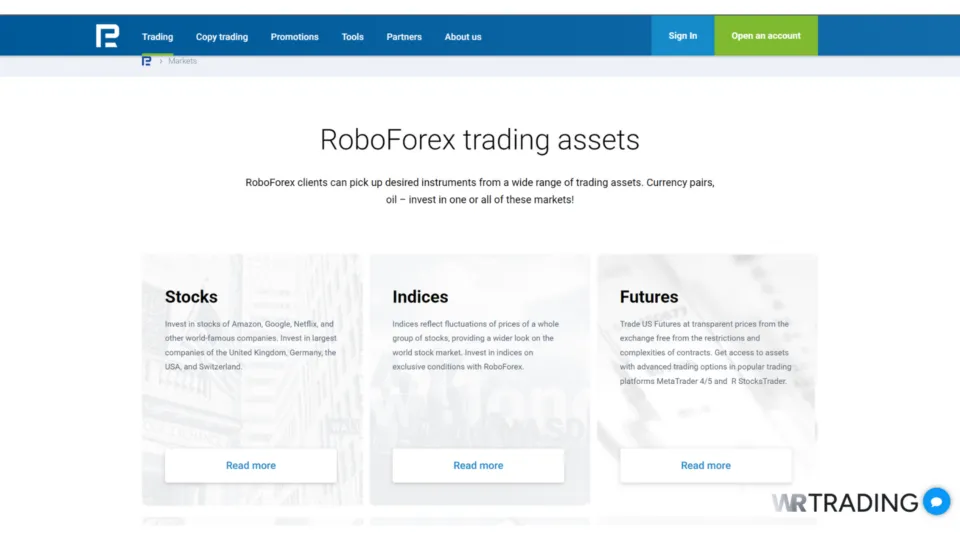
Our hands-on experience with RoboForex was quite positive. The platform’s execution speed was reliable, and the trading tools and automated systems provided an excellent trading environment. The customer support team was responsive and knowledgeable, ready to assist with any questions. Additionally, RoboForex offers a range of educational resources that can help traders improve their skills and knowledge.
| Feature | Information |
|---|---|
| Spreads and Commission | Varies based on account: Spread – from 0.0 pips Commission – 0% |
| Trading Platforms | MetaTrader 4, MetaTrader 5, and R Stocks Trader |
| Asset Types | Stocks, indices, ETFs, commodities, and forex |
| Tradable Assets | Over 12,000 CFDs |
| Leverage | 2000:1 |
| Customer Support | Email, live chat, and phone support |
| Demo Account | Yes |
| Educational Content | None |
| Trade Execution Time | Under 100 milliseconds |
| CFD Swap Fees | Swap fees vary by asset, position type, and account; full rates shown in MetaTrader |
| Regulation | Financial Services Commission (FSC) of Belize |
4. Moneta Markets
Moneta Markets caught our attention with its user-friendly platform and robust analytics. Setting up an account was a breeze, and navigating the platform felt easy and straightforward. Moneta Markets seems to focus on making the CFD trading experience seamless, a significant plus for novice and experienced traders.
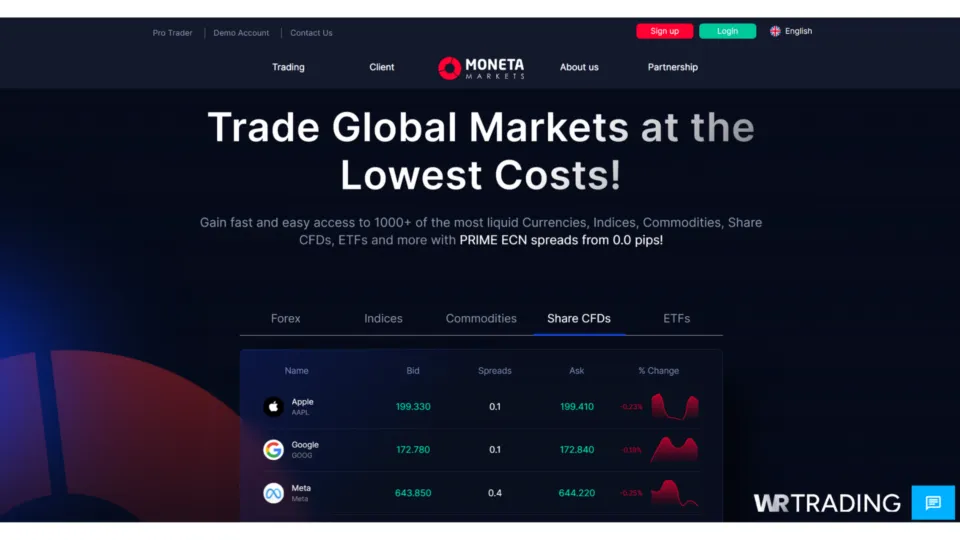
During our review, we found the market analysis tools impressive. These tools provide detailed insights that can help traders make well-informed decisions. Moneta Markets’ competitive spreads, starting at 0.0 pips, make it an attractive option for those looking to minimise trading costs. Furthermore, the CFD broker offers the best trading software, such as MetaTrader 4, MetaTrader 5, Pro Trader, and MT4 WebTrader.
| Feature | Information |
|---|---|
| Spreads and Commission | Varies based on account: Spread – from 0.0 pips Commission – from no commission to $3 per lot |
| Trading Platforms | MetaTrader 4, MetaTrader 5, Pro Trader, and MT4 WebTrader |
| Asset Types | Forex, commodities, indices, ETFs, bonds, and stocks |
| Tradable Assets | Over 1,000 CFDs |
| Leverage | 1000:1 |
| Customer Support | Email, live chat, and phone support |
| Demo Account | Yes |
| Educational Content | Blogs and guides |
| Trade Execution Time | Under 50 milliseconds |
| CFD Swap Fees | Swap fees vary by asset, position type, and account; full rates shown in MetaTrader |
| Regulation | Cayman Islands Monetary Authority and Financial Sector Conduct Authority |
5. BlackBull Markets
BlackBull Markets is a good choice for high-frequency CFD traders, thanks to its lightning-fast execution and deep liquidity. When we tested their CFD platform, we were blown away by the speed and reliability of trade executions – no lag, no slippage, just smooth trading. This kind of performance is a game-changer for traders who need to move quickly in the market, and that is why it is part of our CFD Broker comparison. The CFD platform has advanced charting tools and asset classes, from forex to indices and commodities.
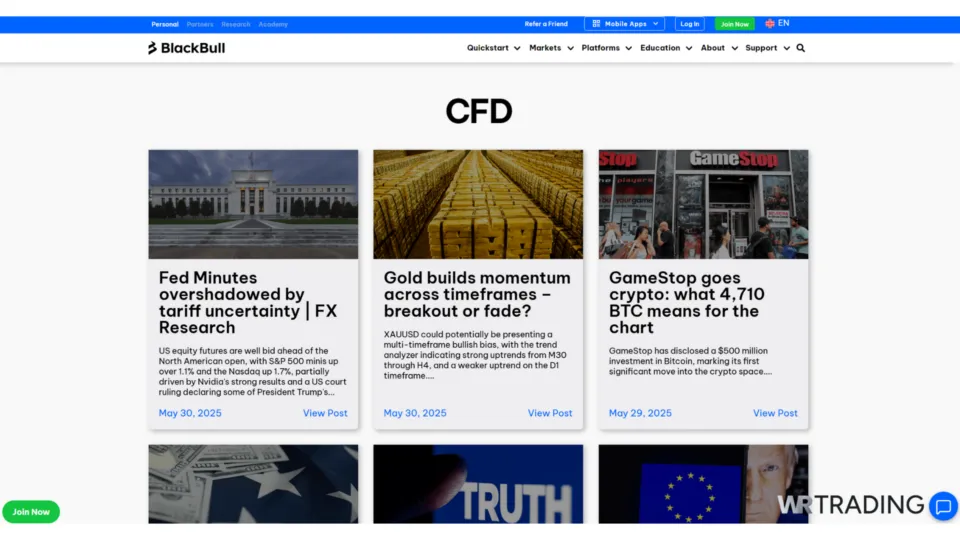
Another highlight of BlackBull Markets is its commitment to providing a robust and feature-rich trading environment. The CFD platform offers customizable options, allowing traders to tailor their setup to fit their needs. We appreciated the seamless integration with popular trading platforms like MetaTrader 4 and MetaTrader 5, further enhancing the trading experience. Let’s not forget their stellar customer support: professional, quick, and always ready to help.
| Feature | Information |
|---|---|
| Spreads and Commission | Varies based on account: Spread – from 0.0 pips Commission – From no commission to $6 per lot |
| Trading Platforms | MetaTrader 4, MetaTrader 5, MetaTrader Web Trader, cTrader, TradingView, and BlackBull Trade |
| Asset Types | Forex, commodities, indices, cryptocurrencies, futures, and stock |
| Tradable Assets | Over 26,000 CFDs |
| Leverage | 500:1 |
| Customer Support | Email, live chat, and phone support |
| Demo Account | Yes |
| Educational Content | Webinars, tutorials, and an education hub |
| Trade Execution Time | Under 20 milliseconds on average |
| CFD Swap Fees | Swap fees vary by asset, position type, and account; full rates shown in MetaTrader |
| Regulation | Financial Services Authority in Seychelles |
6. Pepperstone
Pepperstone excels with its strong regulatory backing and diverse range of trading instruments. The CFD broker offers different account types, such as the Standard and Razor accounts, with the Razor account providing no commission. This makes it a fantastic option for active traders seeking to minimise trading costs.
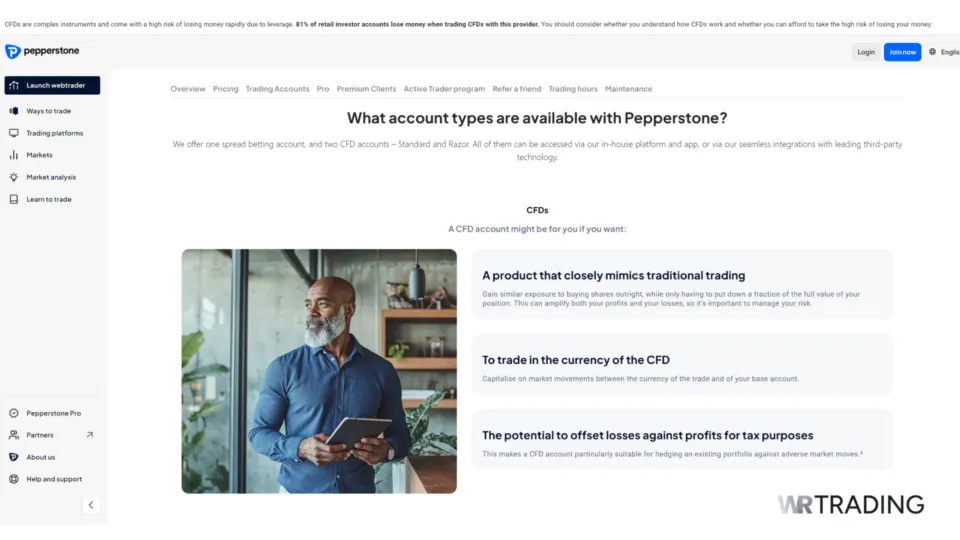
The integration with top trading platforms like MetaTrader 4, MetaTrader 5, TradingView, and cTrader is a significant plus. These platforms offer flexibility and a range of advanced tools. We appreciated these platforms’ customizable charting features, automated trading options, and extensive technical analysis tools.
| Feature | Information |
|---|---|
| Spreads and Commission | Varies based on account: Spread – from 0.0 pips Commission – From no commission to $3 per lot |
| Trading Platforms | MetaTrader 4, MetaTrader 5, cTrader, and TradingView |
| Asset Types | Forex, commodities, indices, cryptocurrency, stocks, and ETFs |
| Tradable Assets | Over 1,200 CFDs |
| Leverage | 500:1 |
| Customer Support | Email and phone support |
| Demo Account | Yes |
| Educational Content | Webinars, educational videos, and trading guides |
| Trade Execution Time | Under 30 milliseconds |
| CFD Swap Fees | Swap fees vary by asset, position type, and account; full rates shown in MetaTrader |
| Regulation | FCA, ASIC, and DFSA |
7. IC Trading
IC Trading is notable for its extensive educational resources and powerful trading platforms. Our review found that the CFD broker offers various educational tools, including tutorials and detailed market analysis. These resources are excellent for traders looking to enhance their trading skills and knowledge.
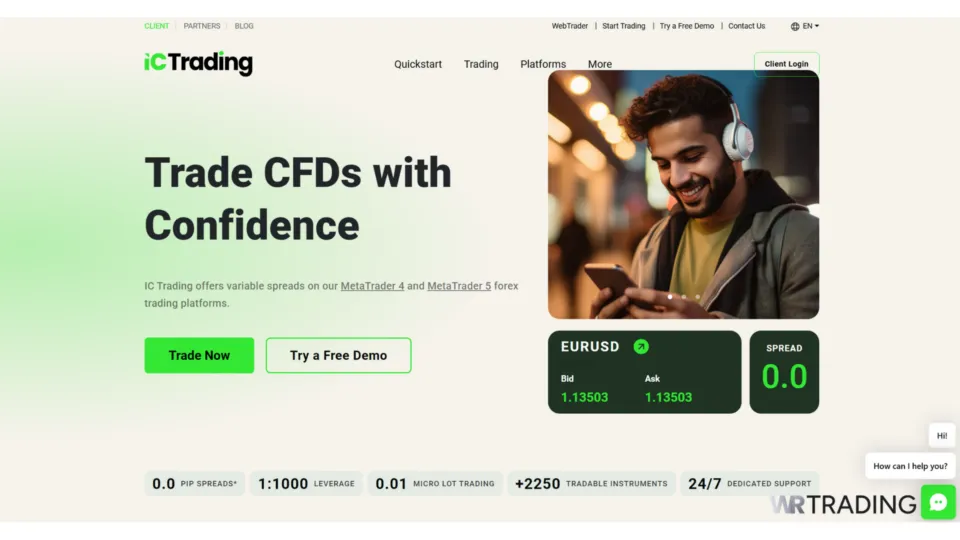
The CFD platform integrates seamlessly with MetaTrader 4, cTrader, and MetaTrader 5. These trading software providers provide advanced charting tools and a wide range of technical indicators, ideal for traders using complex strategies. In our testing, we appreciated the platform’s reliability and fast execution speeds, essential for taking advantage of market opportunities.
| Feature | Information |
|---|---|
| Spreads and Commission | Varies based on account: Spread – from 0.0 pips Commission – From no commission to $3.50 per lot |
| Trading Platforms | MetaTrader 4, MetaTrader 5, and cTrader |
| Asset Types | Forex, commodities, indices, stocks, bonds, and cryptocurrency |
| Tradable Assets | Over 2,250 CFDs |
| Leverage | 500:1 |
| Customer Support | Email, live chat, and phone support |
| Demo Account | Yes |
| Educational Content | Tutorials and blogs |
| Trade Execution Time | Under 40 milliseconds |
| CFD Swap Fees | Swap fees vary by asset, position type, and account; full rates shown in MetaTrader |
| Regulation | Financial Services Commission of Mauritius |
8. Tickmill
We recommend Tickmill because it has some of the lowest spreads compared to other CFD brokers, starting from 0.0 pips, and charges a very competitive commission of $3 per side per 100,000 traded on their Classic Account. These low costs are a big win for traders who maximise their returns.
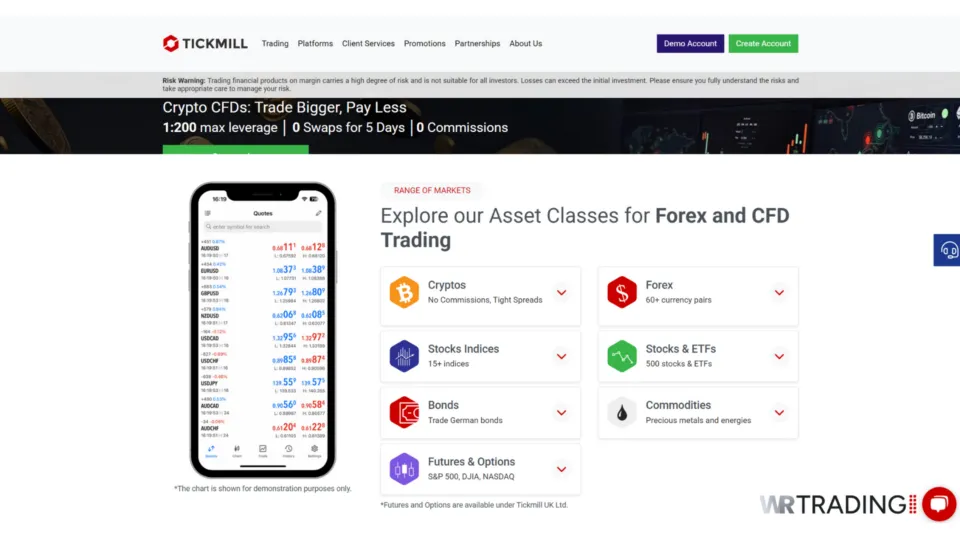
Moreover, the CFD platform’s execution speed averages just 0.15 seconds, ensuring you can exploit market opportunities. With over 60 currency pairs, indices, commodities, and bonds available for trading, Tickmill provides plenty of options to diversify your trading portfolio. Customer support didn’t disappoint either – responsive and knowledgeable, they were available via live chat, email, and phone. Overall, Tickmill’s blend of low trading costs, efficient platform, and reliable customer service makes it a top choice for cost-conscious traders.
| Feature | Information |
|---|---|
| Spreads and Commission | Varies based on account: Spread – from 0.0 pips Commission – From $3 per lot |
| Trading Platforms | MetaTrader 4, MetaTrader 5, MetaTrader Web Trader, and TickMill App |
| Asset Types | Forex, stocks, indices, commodities, bonds, and cryptocurrency |
| Tradable Assets | Over 1,000 CFDs |
| Leverage | 300:1 |
| Customer Support | Email, live chat, and phone support |
| Demo Account | Yes |
| Educational Content | Infographics, tutorials, articles, webinars, and ebooks |
| Trade Execution Time | Under 150 milliseconds on average |
| CFD Swap Fees | Swap fees vary by asset, position type, and account; full rates shown in MetaTrader |
| Regulation | CySEC, FSA, FCA, DFSA UAE, Labuan FSA, and FSCA |
9. FBS
FBS stands out for its flexible leverage options, making it an attractive choice for traders looking to maximise their potential returns. Our review of the CFD broker revealed a user-friendly interface perfect for traders of all experience levels. The CFD broker offers leverage up to 1:3000, one of the highest in the industry. In our testing, FBS impressed us with its low spreads, starting at 0.7 pips.
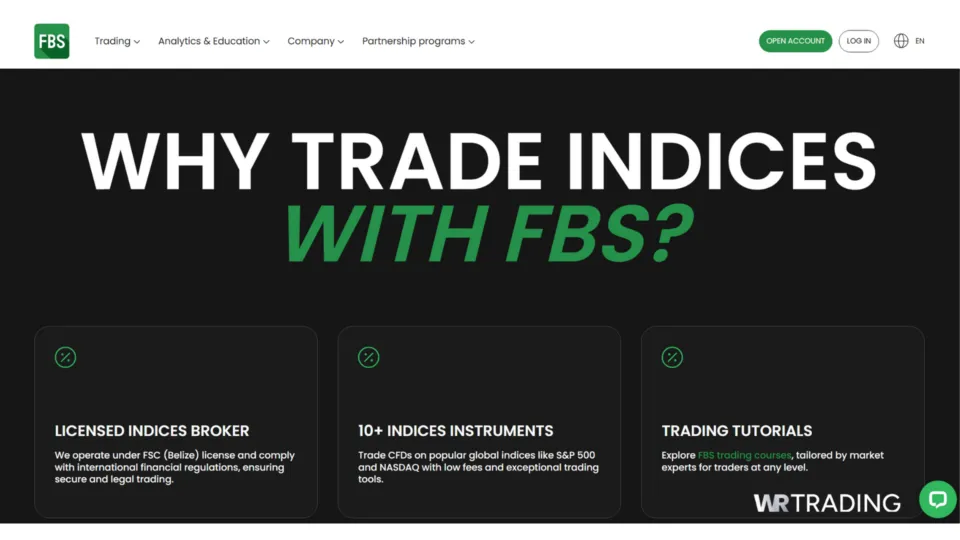
Furthermore, FBS provides a news section that covers developments in the financial sector, which can help with trading decisions. Customer support is available 24/7 via live chat, email, and phone, ensuring traders can get help whenever needed. The broker is regulated by CySEC, an established and well-trusted regulator.
| Feature | Information |
|---|---|
| Spreads and Commission | Varies based on account: Spread – from 0.7 pips Commission – From no commission to $3.50 per lot |
| Trading Platforms | FBS app, MetaTrader 4, and MetaTrader 5 |
| Asset Types | Forex, stocks, indices, and commodities |
| Tradable Assets | Over 50 CFDs |
| Leverage | 3000:1 |
| Customer Support | Email, live chat, and phone support |
| Demo Account | Yes |
| Educational Content | FBS Academy |
| Trade Execution Time | Under 40 milliseconds |
| CFD Swap Fees | Swap fees vary by asset, position type, and account; full rates shown in MetaTrader |
| Regulation | CySEC |
10. VT Markets
VT Markets offers competitive pricing and advanced trading features that caught our attention. We found the CFD broker easy to navigate and packed with valuable tools, like copy trading, economic calendar, and MT4 tools. The standout feature is the tight spreads, starting from 0.0 pips on their Raw ECN account, coupled with a low commission of $6 per side per lot. This pricing model is perfect for cost-conscious people who don’t want to sacrifice quality.
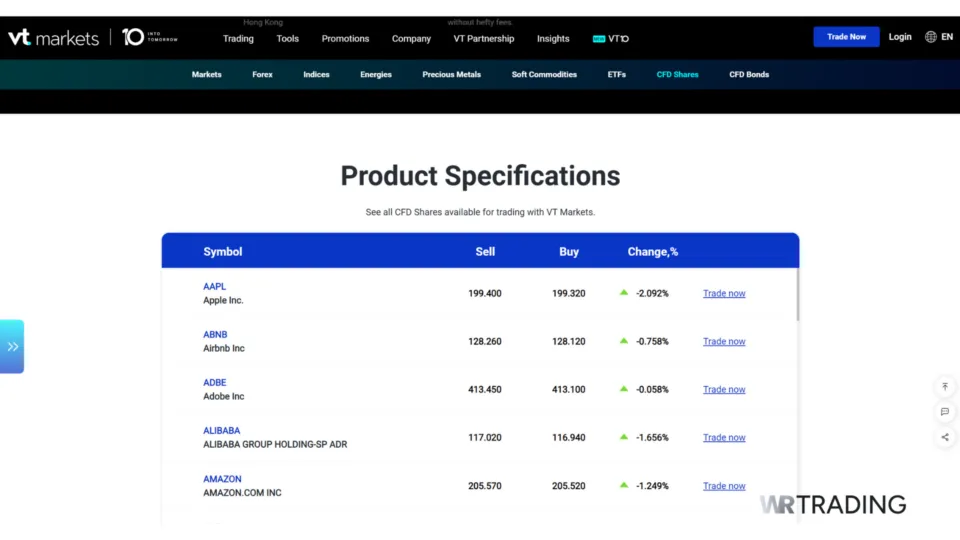
We appreciated VT Markets’ integration with MetaTrader 4 and MetaTrader 5, which brings advanced charting tools, automated trading options, and a wide range of technical indicators. The platform’s fast execution speeds were impressive during our testing, ensuring trades were completed quickly and efficiently. VT Markets supports a variety of trading instruments, including forex, indices, commodities, and cryptocurrencies, providing ample opportunities for diversification.
| Feature | Information |
|---|---|
| Spreads and Commission | Varies based on account: Spread – from 0.0 pips Commission – From no commission to $6 per lot |
| Trading Platforms | Email, help centre, and live chat |
| Asset Types | Forex, stocks, indices, ETFs, bonds, and commodities |
| Tradable Assets | Over 1,000 CFDs |
| Leverage | 500:1 |
| Customer Support | Email, help center, and live chat |
| Demo Account | Yes |
| Educational Content | VT Markets Academy |
| Trade Execution Time | Under 100 milliseconds |
| CFD Swap Fees | Swap fees vary by asset, position type, and account; full rates shown in MetaTrader |
| Regulation | ASIC, FSCA, and Mauritius FSC |
Our Review Methodology to Test CFD Brokers:
To ensure our reviews are accurate and unbiased, we follow a guideline approach to evaluate each CFD broker. Our methodology focuses on several key aspects to provide a comprehensive overview of each broker’s offerings. Here’s how we conduct our reviews:
Platform Usability and Features
We evaluate the CFD broker’s trading platform for usability and functionality. This includes the interface design, ease of navigation, and availability of advanced trading tools like charting capabilities, technical indicators, and automated trading options. We test both desktop and mobile versions to ensure a consistent trading experience.
Costs and Fees
We examined the CFD broker’s fee structure, including spreads, commissions, overnight financing costs, and any additional fees like withdrawal or inactivity fees. Comparing these costs helps us determine each broker’s overall cost-effectiveness, with a focus on transparency and impact on traders’ profitability.
Trade Execution and Reliability
We test the CFD broker’s trade execution speeds and reliability by placing trades in real market conditions. We evaluate how quickly and accurately trades are executed and check for any significant slippage. We assessed the platform’s stability during high volatility periods to ensure it can handle active trading demands.
Range of Instruments
Portfolio diversification requires a diverse range of trading instruments. We evaluate the variety of CFDs available, including forex, indices, commodities, cryptocurrencies, and other assets. We also consider the depth and liquidity of these markets.
If you want to learn how to diversify your portfolio properly, join WR Trading, which multiple professional traders run. You’ll learn strategies, tips, and helpful information for CFD trading there.
Educational Resources
We review the quality and accessibility of the CFD broker’s educational materials, such as webinars, tutorials, articles, and market analysis. Comprehensive educational content helps CFD traders improve their skills and make informed decisions.
Customer Support
Customer support is tested through live chat, email, and phone. We assess the responsiveness, professionalism, and helpfulness of the support team. Adequate customer support is essential for resolving issues quickly and ensuring a smooth trading experience with CFDs.
Regulatory Status and Security
We verify each broker’s regulatory status by checking their registration with relevant financial authorities. Additionally, we assess the security measures to protect clients’ funds and personal information, ensuring a safe and trustworthy CFD trading environment.
How Does a CFD Broker Work?
A CFD (Contract for Difference) broker facilitates trading by providing a platform where traders can speculate on the price movements of various financial instruments without owning the underlying assets. Here’s a closer look at how CFD brokers operate:
How CFDs Work
CFDs allow traders to open positions on an asset’s price direction. Traders can go long (buy) if they anticipate the price will rise or go short (sell) if they expect the price to fall. The trader’s profit or loss is determined by the difference between the opening and closing prices of the contract.
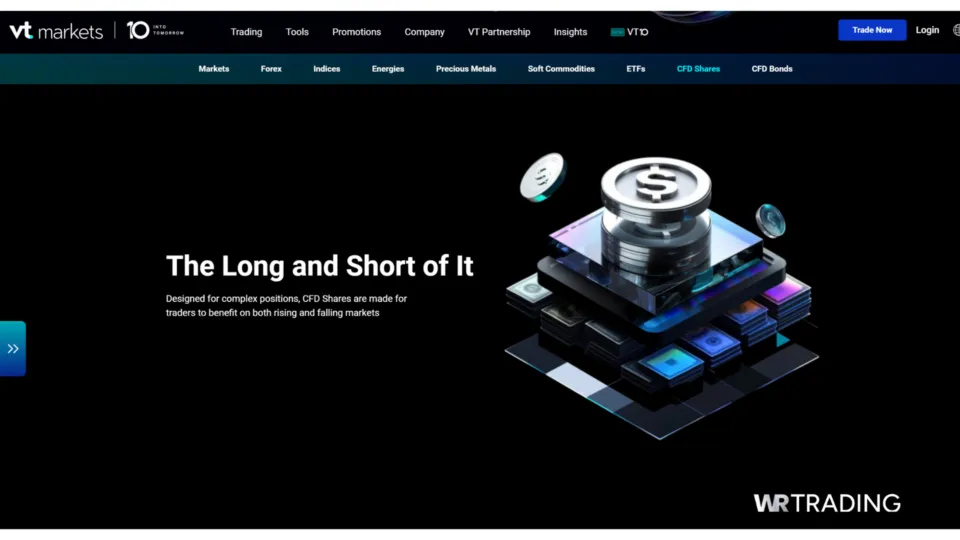
Furthermore, leverage on CFDs lets you trade with more money than you actually deposit by borrowing funds from your broker to increase the size of your position. For example, with 1:500 leverage, you can control a $50,000 trade by depositing just $100. You don’t need the full amount in your account, but you are still responsible for the full gains or losses. Higher leverage can lead to bigger profits, but it also increases the risk of losing more money quickly.
Broker’s Role
The CFD broker acts as an intermediary, providing the platform and tools necessary for trading. Brokers offer access to a range of markets, including forex, indices, commodities, and cryptocurrencies. Also, brokers send your orders to external liquidity providers, such as banks or financial institutions, where trades are matched and settled directly in the market.
This is known as Straight Through Processing (STP) or ECN execution and helps ensure transparent pricing and reliable order execution. Some brokers may also handle trades internally, depending on the account type or execution model used.
What is the typical Leverage on CFD Brokers?
Most CFD brokers offer leverage that ranges from 1:30 to 1:500, depending on the trader’s location, the broker’s license, and the type of asset being traded. Forex pairs usually come with the highest leverage, often reaching 1:500 or more with offshore brokers. CFDs on stocks, indices, or cryptocurrencies tend to have lower leverage, usually between 1:5 and 1:100, because they carry more risk and larger price swings.
In regions like the EU, regulators such as ESMA limit retail leverage to 1:30 for forex to protect traders from heavy losses. However, in places like the UAE or with non-restricted international brokers, much higher leverage may be available.
Which restrictions on Leveraged CFD Trading exist?
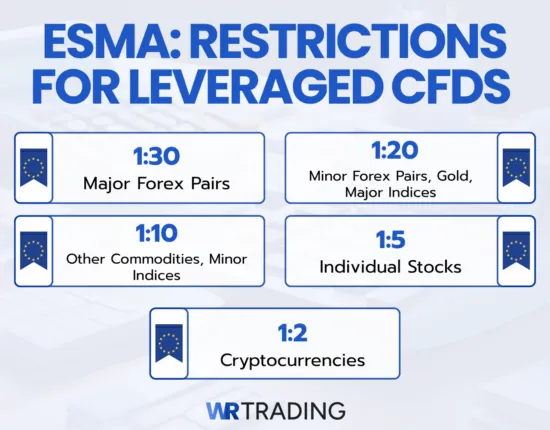
Restrictions on CFD leveraged trading vary by jurisdiction with some locations being much more strict than others. In the European Union, retail traders face leverage limits under rules set by ESMA (European Securities and Markets Authority). These restrictions were introduced to protect inexperienced traders from large, rapid losses. Under ESMA regulations:
- Major forex pairs are limited to 1:30
- Minor forex pairs, gold, and major indices are limited to 1:20
- Other commodities and minor indices are capped at 1:10
- Individual stocks are capped at 1:5
- Cryptocurrencies are restricted to 1:2
These limits apply only to traders classified as retail clients in ESMA-regulated regions like the EU, UK, and EEA. Traders who qualify as professionals can access higher leverage, but they give up certain protections like negative balance safeguards.
However, brokers that operate outside of ESMA regulations, such as those registered in offshore jurisdictions or in countries like the UAE, often offer much higher leverage, sometimes up to 1:500 or more. These brokers are not bound by ESMA caps, which makes them more appealing to high-risk traders.
Is CFD Trading halal?
No, standard CFD trading is not halal due to overnight interest charges, known as riba, which are forbidden under Islamic law. These interest payments occur when positions are held open overnight, making most conventional CFD accounts non-compliant with Sharia principles.
To address this, many brokers offer Islamic accounts, also called swap-free accounts, that remove all interest-related charges. Instead of earning or paying swaps, these accounts may apply a fixed fee or adjust the spreads to cover holding costs.
Islamic accounts are intended to align with Sharia law, but the conditions vary between brokers. Traders must request this account type during registration and verify that no hidden interest charges are applied.
How Brokers Make Money
CFD brokers earn money through spreads, commissions, and overnight financing charges. The spread is the difference between a CFD’s buying and selling prices. Commissions are fees charged per trade, and overnight financing is a fee charged when a position is held overnight.
Does a CFD Broker Trade Against Its Client?
The question of whether a CFD broker trades against its client depends on the type of broker model they use:
A-Book Brokers
A-Book brokers, STP (Straight Through Processing) or ECN (Electronic Communication Network), pass their clients’ trades directly to the market. They do not take the opposite side of the client’s trades, thus eliminating any conflict of interest. Instead, they earn money from spreads and commissions.
B-Book Brokers
On the other hand, B-Book brokers take the opposite side of their clients’ trades. They effectively act as the counterparty, meaning they profit when the client loses and vice versa. This model can create a potential conflict of interest, as the broker might benefit from the client’s losses.
Hybrid Approach
Most brokers use a combination of A-Book and B-Book models. They don’t trade against each client individually; instead, they monitor the overall exposure of all clients’ trades and decide which trades to pass directly to the market (A-Book) and which to handle internally (B-Book). This approach allows brokers to manage risk more effectively while providing a balanced trading environment for their clients.
Regulation of CFD Brokers – Types & Details:
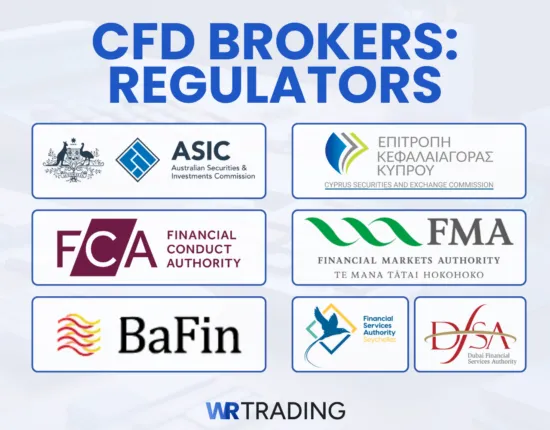
Regulation is a critical factor when selecting a CFD broker, as it ensures the broker operates within a legal framework designed to protect traders. Regulated brokers are monitored by financial authorities, which helps maintain transparency, security, and fairness in the trading environment. Some of the top CFD brokers regulators are:
- FCA – Financial Conduct Authority (United Kingdom)
- ASIC – Australian Securities and Investments Commission (Australia)
- CySEC – Cyprus Securities and Exchange Commission (Cyprus)
- DFSA – Dubai Financial Services Authority (UAE)
- BaFin – Federal Financial Supervisory Authority (Germany)
- FSA – Financial Services Authority (Seychelles)
- FMA – Financial Markets Authority (New Zealand)
Here’s why regulation is important and how you can verify if a broker is regulated:
Importance of Regulation
Regulated brokers follow strict guidelines that safeguard traders’ interests. These guidelines typically include:
- Segregation of Client Funds: Client funds are kept separate from the broker’s operating funds, protecting traders’ money even if the broker encounters financial issues.
- Regular Audits: Financial authorities conduct regular audits to ensure brokers are following industry standards.
- Fair Trading Practices: Regulated brokers must engage in fair trading practices, preventing market manipulation and ensuring transparent pricing.
Regulation provides trust and security, giving traders confidence that their funds and personal information are safe.
How to Find Out if My CFD Broker Is Regulated
Verifying a broker’s regulatory status is essential before opening an account. Here’s a straightforward guide on how to check if your CFD broker is regulated:
- Broker´s Website
- Regulatory Authority’s Website
- Broker’s Details
Step 1: Visit the Broker’s Website
Start by visiting the broker’s official website. Reputable brokers usually display their regulatory information prominently. Look for details such as the regulatory authority and the broker’s license number. This information is often found in the footer of the homepage or under sections like “About Us” or “Legal Information.”
Step 2: Visit the Regulatory Authority’s Website
After noting the regulatory authority and license number, go to the official website of the regulatory authority mentioned. Most financial regulatory bodies have a searchable database where you can verify the broker’s credentials.
Step 3: Verify the Broker’s Details
Enter the broker’s name or license number into the search bar of the regulatory authority’s database. Confirm that the details match the information provided on the broker’s website. Check their license status to ensure it is active and in good standing. Ensure that the company name, address, and license number are consistent with what the broker has listed on their website.
Where Are CFD Brokers Banned?
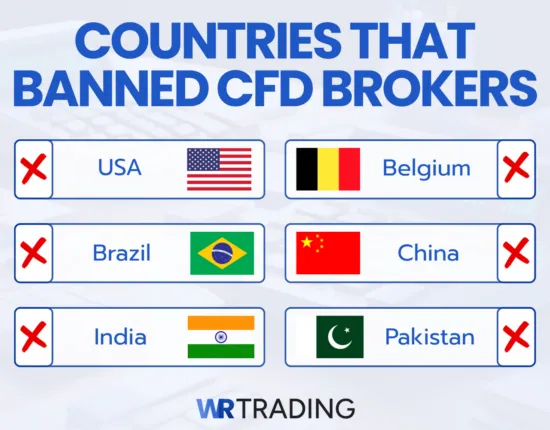
CFD trading is banned or heavily restricted in a few countries due to regulatory concerns about risk, speculation, and investor protection. These bans are enforced by national financial authorities that prohibit local brokers from offering CFD products to retail traders. Countries where CFD trading is banned include:
- United States – CFDs are not permitted under SEC and CFTC rules.
- Belgium – The FSMA has fully banned CFDs for retail clients.
- Brazil – The CVM restricts CFD offerings by brokers inside the country.
- India – SEBI prohibits brokers from offering leveraged derivatives like CFDs to retail clients.
- China – CFDs are not allowed for local retail traders. Mainland brokers are banned from offering them.
- Pakistan – Local authorities restrict access to foreign CFD brokers due to risk and capital outflow concerns.
Are CFDs Allowed in the USA?
No, CFDs are not allowed for retail traders in the United States. U.S. regulators like the SEC and CFTC don’t permit brokers to offer CFDs because of the high risk and lack of centralized oversight. That means you won’t find any U.S.-based broker offering CFDs to local traders.
Some offshore brokers still accept U.S. clients, but trading through them can be risky and might go against U.S. regulations. If you’re based in the U.S. and want to trade with leverage, the legal alternatives are usually futures, options, or forex accounts with registered U.S. brokers. These products are regulated differently and come with their own rules and protections.
Fees and Costs When Trading CFDs
Understanding the fees and costs of trading CFDs (Contracts for Difference) helps manage your trading budget and maximise profitability. Here are the main types of fees you should be aware of when trading CFDs:
Spreads
The spread is the difference between the buying price (ask) and the selling price (bid) of a CFD. This is a primary cost in CFD trading. Brokers offer variable spreads, which can widen or narrow depending on market conditions. Major forex pairs such as EUR/USD often have spreads as low as 0.0 to 1.5 pips, depending on market conditions.
More volatile assets or exotic currency pairs may carry spreads ranging between 2 and 5 pips. It’s essential to compare spreads across brokers, as even slight differences can impact your overall trading costs, especially if you trade frequently.
Commissions
Some brokers charge a commission on each trade. This fee is usually a fixed amount per trade or a percentage of the trade value. Brokers that charge commissions often offer lower spreads, which might benefit high-volume traders. Commission-based accounts usually charge between $3 and $7 per lot traded. Always check both the spread and commission structures to understand the total cost of each trade.
Overnight Financing Fees
Also known as swap rates, these fees are charged when you hold a CFD position overnight. The cost depends on the direction of your trade (long or short) and the interest rate differential between the currencies in the pair you are trading. Holding a position overnight can lead to costs ranging from $2 to $10 per standard lot, and these fees can add up if you hold positions for extended periods, so it’s important to factor them into your trading strategy.
Inactivity Fees
Some brokers charge a flat fee of $5 to $15 per month if no trades are placed for a specific time period. These fees can be a fixed monthly amount and can eat into your trading capital if you don’t trade regularly. Check the broker’s policy on inactivity fees and consider how often you plan to trade.
Withdrawal Fees
Withdrawal fees are charged when you transfer funds from your trading account to your bank account. These fees can vary based on the withdrawal method and the amount being withdrawn. Bank wire withdrawals may cost anywhere from $20 to $30 per transaction. Other methods like e-wallets may be cheaper or even free, depending on the provider and broker policy.
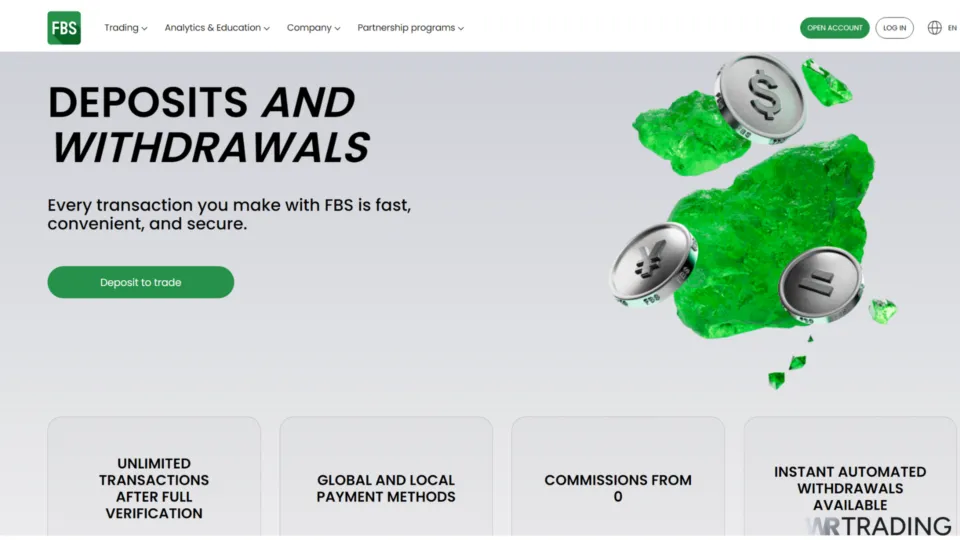
Data Feed Fees
Some brokers charge for access to premium data feeds or advanced charting tools. While many brokers include basic data and charting tools for free, advanced features might come with additional costs. Advanced data tools or premium chart packages can cost between $10 and $50 per month. These are optional and suited for traders who need detailed real-time market insights. Evaluate whether these tools are necessary for your trading strategy and consider the cost implications.
How to Avoid CFD Trading Platform Scams:
CFD trading offers exciting opportunities and attracts scams and fraudulent brokers. Protecting yourself from these scams requires vigilance and knowledge. If you’re having trouble figuring out what platforms to avoid, the professional traders at WR Trading will gladly help. They offer 1-on-1 help, trade analysis, and guidance in trading. Here are some essential tips to help you avoid CFD trading scams:
Choose Regulated Brokers
The most crucial step is to ensure that a recognised financial authority regulates your broker. Regulated brokers must adhere to strict standards and are regularly audited, providing additional security for traders. Always verify the broker’s regulatory status on the official website of the regulatory authority.
Research the Broker’s Reputation
Before committing to a broker, research their reputation thoroughly. Read independent reviews, check trader forums, and look for negative feedback or red flags. Be wary of brokers with consistent complaints about withdrawal difficulties, poor customer service, or unfair practices.
Be Wary of Unrealistic Promises
Scammers often lure traders with promises of guaranteed high returns and risk-free trading. All trading involves risk, and no legitimate broker can guarantee profits. Be sceptical of any broker or trading system that makes such claims.
Check for Transparency
A trustworthy broker should be transparent about fees, charges, and trading conditions. Ensure you understand the broker’s fee structure, including spreads, commissions, overnight fees, and other potential costs. Avoid brokers who are vague or evasive about these details.
Educate Yourself
Knowledge is your best defence against scams. Take the time to learn about CFD trading, common scams, and how to recognise warning signs. The more informed you are, the better equipped you’ll be to spot and avoid fraudulent schemes.
Which Taxes Need To Be Paid When Trading With A CFD Broker?
The taxes you need to pay when trading CFDs depend on your country of residence. In most regions, profits from CFD trading are treated as capital gains or income, and they must be reported to your local tax authority. For example, in the United Kingdom, CFD profits are taxed as capital gains with rates ranging from 10% to 20%, depending on your income level.
In Germany, profits from CFDs are subject to a flat 25% capital gains tax, plus solidarity surcharge. Canada treats CFD profits as income, which can be taxed at rates up to 33%. Also, some CFD brokers are now integrating automated tax reporting and withholding systems for clients in countries that require it.
This means certain brokers may directly deduct or report taxes to your government, where tax authorities require brokers to track and report CFD activity. However, most international brokers still expect the trader to handle their own tax reporting.
Conclusion: FP Markets is our Top CFD Broker
After extensively testing and comparing many CFD brokers across different platforms, fee structures, support teams, and trading tools, we’ve narrowed it down to ten top choices. Each broker on this list was reviewed using a live or demo account to evaluate spreads, order execution speed, usability, and customer responsiveness under real trading conditions. Our goal was to identify brokers that perform reliably, offer fair pricing, and give traders a clear and stable environment.
Top 10 CFD Brokers:
- FP Markets: Best overall – lowest spreads, multiple regulation, personal support, all platforms
- Vantage Markets: Best for high CFD Trading leverage
- RoboForex: Best for low minimum deposits
- Moneta Markets: Best for a user-friendly platform and interface
- BlackBull Markets: Best for the fastest execution on CFDs
- Pepperstone: Best for strong regulation
- IC Trading: Extensive educational materials.
- Tickmill: Low trading costs.
- FBS: Flexible leverage options.
- VT Markets: Excellent mobile trading experience.
Each CFD broker has its strengths, so the best choice depends on your personal trading goals and preferences. Open a demo or real account with a few of them to see how the platform feels, how quickly trades are executed, and how well the support team responds. Testing brokers yourself is the most effective way to find out which one fits your trading style.
Frequently Asked Questions on ECN Brokers for Forex Trading
Can You Try A CFD Broker For Free?
Yes, you can try out a CFD Broker for free. Most brokers offer free and unlimited CFD Trading Demo Accounts, which are accounts with a virtual balance that can be used to practice trading.
How Do I Choose the Best CFD Broker?
Choose a CFD broker by considering regulation, fees, trading platform features, and customer support. Look for a broker with a user-friendly platform, competitive spreads, and robust security measures. Reviewing and testing demo accounts can help you make an informed decision.
Are CFD Brokers Regulated?
Yes, many CFD brokers are regulated by financial authorities, ensuring they adhere to strict standards for transparency and security. Always check the broker’s regulatory status on the authority’s official website. Regulated brokers provide a safer trading environment.
Can I Lose More Money Than I Invest in CFDs?
Yes, trading CFDs with leverage means you can lose more money than your initial investment. This is because leverage amplifies both gains and losses. Use risk management tools and understand the risks involved in CFD trading.
How Do I Avoid CFD Trading Scams?
Avoid CFD trading scams by choosing regulated brokers, researching the broker’s reputation, and being wary of promises of guaranteed returns. Verify the broker’s regulatory status and read reviews from other traders. Always be cautious of deals that seem too good to be true.








